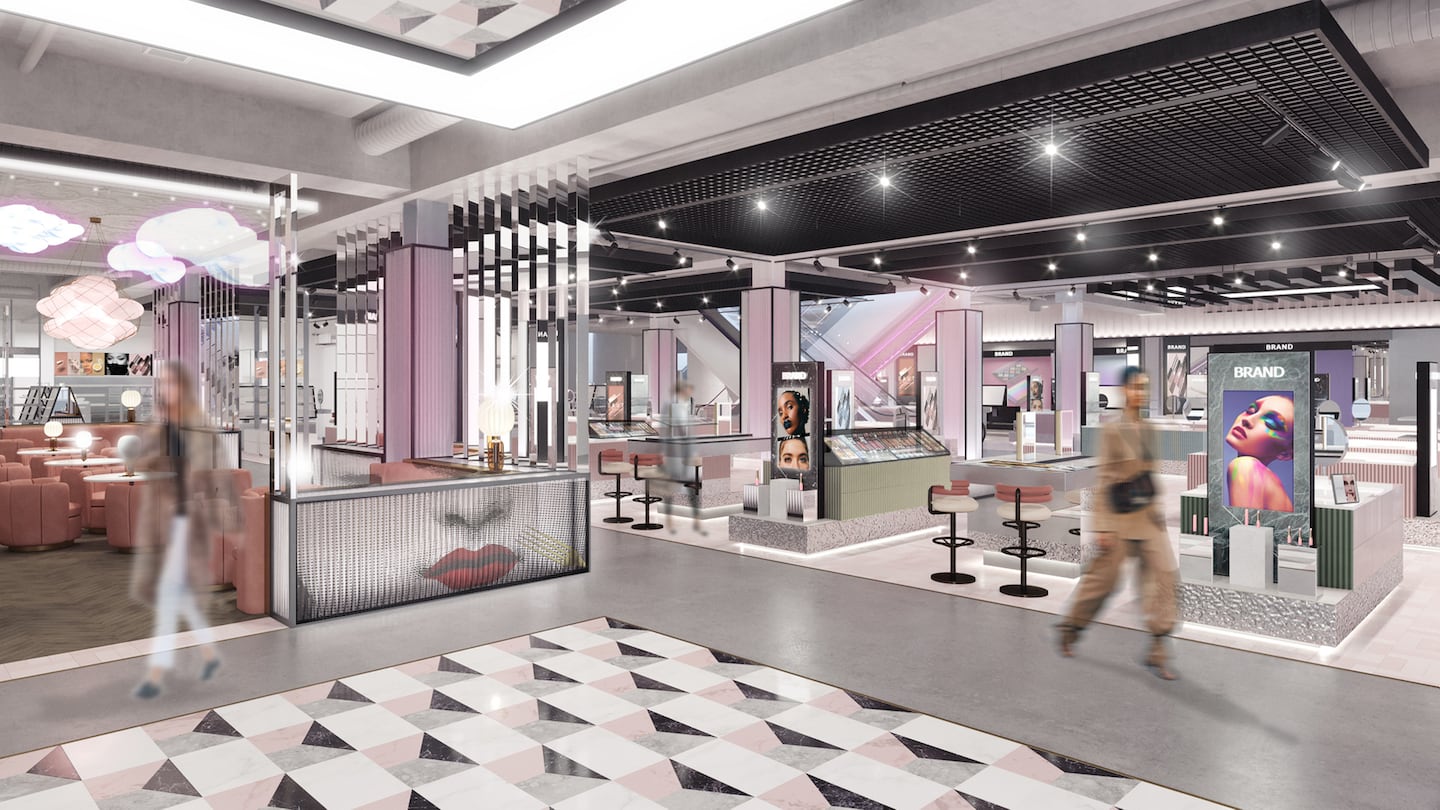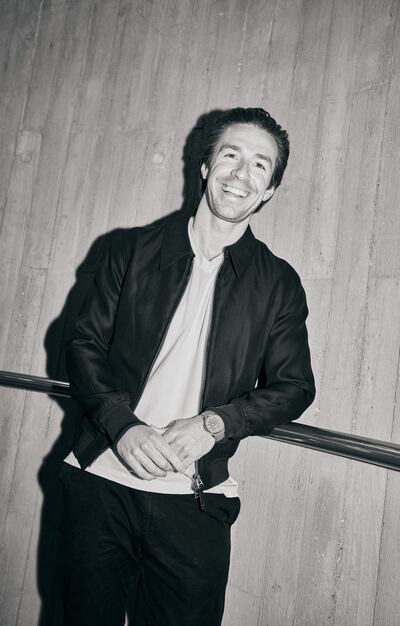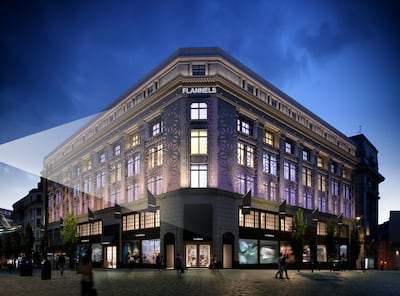
The Business of Fashion
Agenda-setting intelligence, analysis and advice for the global fashion community.

Agenda-setting intelligence, analysis and advice for the global fashion community.

Since 1976, luxury retailer Flannels has operated as a specialist in building and maintaining a successful regional store network, leading to its acquisition by Frasers Group in 2017. Today, Flannels is continuing that expansion, with plans to open a total of 15 experience-oriented flagships across the UK by 2025.
In 2021, Flannels opened more than 10 stores, including a 60,000 square foot flagship in Sheffield, in addition to stores in Leicester, Brighton and Southampton — cities that have been typically underserved by traditional luxury players. In 2022, Flannels will open a further 10 retail outposts, including a flagship in Ireland, as well as a 120,000 square foot in Liverpool. The retailer sells men’s, women’s, kidswear and beauty categories and counts Balenciaga, Off-White, Stone Island, Bottega Veneta, Dr. Barbara Sturm and Gucci Beauty among its roster of brands.
It is timely positioning. The BoF & McKinsey and Co.’s State of Fashion 2022 report forecasts domestic luxuries as a key theme for the year ahead. Before the Covid-19 pandemic, the report stated 30 to 40 percent of luxury sales were generated by shoppers abroad. The stalling of international travel saw global tourism spend cut nearly in half in 2021. With international tourism facing continued disruption in 2022, repatriated luxury spend represents a significant growth opportunity for well-positioned retailers.
Now, BoF sits down with Frasers Group’ incoming CEO Michael Murray to gain insight into what makes a successful regional retail strategy, the operational benefits of a physical network in a digitised landscape and Flannels evolution as a key partner to luxury brands entering new regions.

What makes a regional retail strategy successful?
If you take a trip back over the last 10 years and factor in the rise of social media, all consumers have a broader understanding of luxury brands and trends, and these are now [present] over a lifetime. Despite this, regional luxury retail has been non-existent or, at best, poorly underserved, with a considerable lack of investment.
The space has largely been about small independents who have not really moved the model on, modernised into a digital era, or invested in their stores. We saw a gap in the market to invest in regional cities and the numbers show the demand for underserved territories. We’ve been doing that over the last four years, opening in [varied] regional locations across the UK which we believe are underserved for the luxury consumer, and we are seeing considerable revenue growth. The compound annual growth rate from taking full ownership in FY18 is more than 40 percent.
How do you foresee domestic luxury spend being impacted by the return of tourism?
We’re fortunate because Flannels is not a business that has been built around the pandemic. While the business obviously accelerated when customers couldn’t travel, it was already on a strong trajectory, pre-pandemic. We have seen consistent steady growth since 2017 when we started this expansion strategy.
We’re [encouraged] by inbound tourism — customers visiting the UK – as travel returns. However, 90 percent of our sales are generated in the UK, outside of London. We are very much insulated as a domestic, localised fashion retailer. Take Liverpool, where we’re opening a 120,000 square foot store. It’s a major UK city with two football teams, yet very underserved. There are hardly any luxury goods [destinations] in the city, meaning that regional consumers are having to travel to London or to global cities to have that experience.
At Flannels, we obsess over making luxury accessible and ensuring all our consumers feel welcome to new luxury. This means not only bringing them the world’s best luxury brands, such as Gucci, Prada, Bottega, Burberry, but also more [directional] contemporary brands such as Ganni and Fear of God. We want to bring a mix of brands to that local consumer and give them the experience of shopping luxury in their home territory.
How are you selecting the locations for the flagships you plan to open?
The first regional flagships — Leicester, Sheffield and Liverpool — are cities where we already had an existing presence. We, therefore, had a very deep understanding of the local consumer in these cities and strong market penetration. We also look at our digital sales and similar analysis to inform our [physical expansion]. We examine which brands are selling online in these regions, beyond our in-store offerings. What that data tells us is that these markets are craving a luxury experience beyond what we’re offering, despite us already having physical stores in that market. That’s where the flagship opportunity [stems] from.
Regional retail is still treated as a poor relation to the global cities. We absolutely must give that same experience to everybody.
Our current store in Liverpool is 20,000 square feet, and the flagship will be 120,000 square feet, bringing various different categories into the stores. It won’t just be fashion, we will also be looking at watches and jewellery, activewear and bringing more contemporary brands which we couldn’t currently give credible space in our existing store. We’re excited to broaden the offer into the relevant cross categories for luxury fashion.
How important is the experiential offering of a regional store network?
It’s the number one priority because it’s integral [to luxury] itself, be that the customer experience within the store, the store’s look and feel — even down to the music playing. Regional retail is still treated as a poor relation to the global cities, yet luxury fashion brands are perceived by all consumers in a similar way. We absolutely must give that same experience to everybody, regardless of whether or not they’re based in the traditional fashion hubs of London, Paris and Milan. All customers have a right to the same experience.
In terms of the Liverpool flagship, we’re launching new categories such as activewear and partnering with a leading world-class fitness studio in the process. In the beauty area, we’re continuing to disrupt the traditional beauty model with our brand mix and the rollout of the world’s first beauty changing rooms. [Here,] shoppers can buy beauty products and take them into the beauty booth, use a wind machine, [apply] their makeup, scan a QR code and receive a polaroid picture — there’s various interactive experiences. We’re then prioritising bringing food and drink into our stores too, to support dwell time. Again, the priority here is bringing experiences that the regional customers would typically travel to London to experience.

We also consider omnichannel [solutions] to be a key part of the customer experience. Shoppers can buy online, collect in-store, book a stylist, changing room and even an associate to assist as they walk around the store, informing them of new brands. Service experience is a number one priority for us.
What role does digital engagement play?
At Flannels, we’ve been investing heavily in our back-end system. We’ve spent over 150 million pounds in automation so that all of our products can be handled carefully and efficiently in our warehouses. This allows us to stock a higher level quantity of brands than our competitors.
We want to hone the basics, from digital deliveries on time to deliveries to store, warehouse automation, website speed and clicks per purchase. It’s all of these little nuts and bolts — these are the things that we obsess over. Then, when there are new digital trends that are scalable and we feel as though we can execute them at the right service level, we will roll them out. For instance, we have plans to reposition our London store, pivoting it to a digital-first proposition. However, when it comes to digital, we err on the side of caution. It’s critical to [ensure] it isn’t a fad and just becomes something redundant that nobody uses. You’ve got to let it get to a level of maturity before you can do it at scale.
What’s next in your expansion strategy?
Fundamental to my direction and leadership of the group, we will be investing significantly into understanding the future Gen-Z consumer. We feel confident that we know where the current consumer is and what they want but it’s now about identifying shopping habits for the next five to ten years. Flannels this year will further identify its market position in the luxury landscape and will invest and curate an all-new proposition for our brand partners and consumers.
We want to hone the basics, from digital deliveries on time to deliveries to store, warehouse automation, website speed and clicks per purchase.
When we look around the industry, there is constant change: there’s been more of it in the last five years than the previous fifty. New luxury is inclusive, expansive, and more exciting than it’s ever been. We are seeking to democratise the fashion space through our regional strategy. We want to offer our brands access to valuable and untapped audiences, and we want to surprise and delight our customers by giving them an elevated retail experience locally.
Our retail expansion has exceeded our expectations — particularly our flagship model. Typically, Flannels has been 20,000 square feet and now we are playing with 100,000 square feet. We had to push boundaries to impact larger regional cities. Our expansion plans also include international expansion— looking at underserved markets in cities in Europe. We’re going to focus on developing that international strategy and all the capabilities and logistics to support it. Finally, in keeping with Flannels’ direction, we have a strategy in development to transform the Flannels brand into a cultural access point and we have created an infrastructure with our creative partners to show up and operate like a platform. We want Flannels to be a creative space where brands can test, learn, try new technologies and ideas, and co-create with us.
This is a sponsored feature paid for by Flannels as part of a BoF partnership.
Designer brands including Gucci and Anya Hindmarch have been left millions of pounds out of pocket and some customers will not get refunds after the online fashion site collapsed owing more than £210m last month.
Antitrust enforcers said Tapestry’s acquisition of Capri would raise prices on handbags and accessories in the affordable luxury sector, harming consumers.
As a push to maximise sales of its popular Samba model starts to weigh on its desirability, the German sportswear giant is betting on other retro sneaker styles to tap surging demand for the 1980s ‘Terrace’ look. But fashion cycles come and go, cautions Andrea Felsted.
The rental platform saw its stock soar last week after predicting it would hit a key profitability metric this year. A new marketing push and more robust inventory are the key to unlocking elusive growth, CEO Jenn Hyman tells BoF.